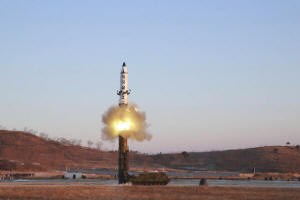|
U.N., Trump denounce North Korea, but no
sign of any action
 Send a link to a friend
Send a link to a friend
 [February 14, 2017]
By Ned Parker and Ju-min Park [February 14, 2017]
By Ned Parker and Ju-min Park
UNITED NATIONS/SEOUL (Reuters) - The U.N.
Security Council denounced North Korea's weekend missile launch, urging
members to "redouble efforts" to enforce sanctions against the reclusive
state, but gave no indications of any action it might take.
Pyongyang's test of the intermediate-range ballistic missile on Sunday
was its first direct challenge to the international community since U.S.
President Donald Trump took office on Jan. 20.
At a news conference on Monday, Trump said: "Obviously North Korea is a
big, big problem and we will deal with that very strongly."
Trump did not speak of any planned response but Washington's U.N.
ambassador Nikki Haley said in a statement: "It is time to hold North
Korea accountable – not with our words, but with our actions."
She issued the statement after an emergency Security Council meeting on
Monday that was called by the United States, Japan and South Korea to
discuss the North's missile launch.
U.S., Japanese and South Korean military officials held a teleconference
on Monday in which they condemned the launch as "a clear violation" of
multiple Security Council resolutions. The United States "reaffirmed its
ironclad security commitments" to South Korea and Japan, the Pentagon
said.
A South Korean official said the United States has planned to deploy
"strategic assets" in upcoming annual military exercises with South
Korea because of the increased threat from the North. The exercises
usually start in March.

The official did not say what assets might be used. In the past, these
have included B-2 bombers, F-22 stealth fighter jets and nuclear-powered
submarines.
In Beijing, China's Foreign Ministry said it hoped that under present
circumstance all countries could maintain restraint and not do anything
to escalate the situation.
"We urge all sides to adopt a responsible attitude and make their own
efforts to jointly promote the appropriate resolution of the Korean
Peninsula nuclear issue," ministry spokesman Geng Shuang told a daily
news briefing.
China is North Korea's main ally and trading partner but is irritated by
its repeated aggressive actions, although it rejects suggestions from
the United States and others that it could be doing more to rein in its
neighbor.
North Korea rejected the U.N. Security Council's statement and said its
missile development was for self-defense.
"The various test fires conducted by DPRK for building up self-defense
capabilities are, with no exception, self-defense measures to protect
national sovereignty and the safety of the people against direct threats
by hostile forces," Han Tae Song, the new ambassador of the Democratic
People's Republic of Korea (DPRK) to the United Nations in Geneva, told
a conference.
ICBM TEST
South Korea's intelligence agency estimates the solid-fuel missile
launched by North Korea on Sunday has a range of more than 2,000 km
(1,240 miles), according to a lawmaker briefed by the agency. That would
bring large parts of China, Taiwan, Japan and Russia within range.
[to top of second column] |

A view of the test-fire of Pukguksong-2 guided by North Korean
leader Kim Jong Un, in this undated photo released by North Korea's
Korean Central News Agency. KCNA/Handout via Reuters

The North has tested missiles with a range of over 3,000 km (2,000
miles) in the past, but has said it is on the verge of testing an
intercontinental ballistic missile (ICBM), which could eventually
threaten the continental United States, which is about 9,000 km
(5,500 miles) from North Korea.
"We are keeping an eye out, thinking data and technology from the
latest test can be applied (to an ICBM)," South Korean Defense
Minister Han Min-koo told lawmakers on Tuesday.
He added it was his belief that the new administration in the United
States was still formulating a North Korea policy.
North and South Korea are technically still at war because their
1950-1953 conflict ended in a truce, not a peace treaty. The North
regularly threatens to destroy the South and the South's main ally,
the United States.
The Security Council did not specify what steps might be taken
beyond the U.N.-sponsored sanctions regime imposed on North Korea
since 2006 over its nuclear and ballistic missile tests.
"The members of the Security Council deplore all the Democratic
People's Republic of Korea ballistic missile activities, including
these launches," the council said in a statement that also referred
to North Korea's missile launch on Oct. 19.
The council "called upon all member states to redouble their efforts
to implement fully the measures imposed on the Democratic People's
Republic of Korea by the Security Council."
Japanese Prime Minister Shinzo Abe said on Monday that he expected
the Trump administration would adopt a harder line on North Korea.
"I believe that the stance of the United States towards North Korea
will become much tougher, that is clear," Abe said on an NHK public
broadcasting news program after returning from meetings with Trump
in the United States.
North Korea has said any sanctions against its missile or nuclear
programs are a violation of its sovereignty and right to
self-defense.
(Additional reporting by Idrees Ali and Emily Stephenson in
Washington, Elaine Lies in Tokyo and Ben Blanchard in Beijing;
Editing by Raju Gopalakrishnan)
[© 2017 Thomson Reuters. All rights
reserved.]
Copyright 2017 Reuters. All rights reserved. This material may not be published,
broadcast, rewritten or redistributed.

 |